Welcome to the Peacemaker's Toolbox, a series committed to fostering and nourishing PRACTICAL ways we can foster peace in ourselves, our homes, our relationships, communities, etc.
To get more of the backstory of the Toolbox, read the first post.
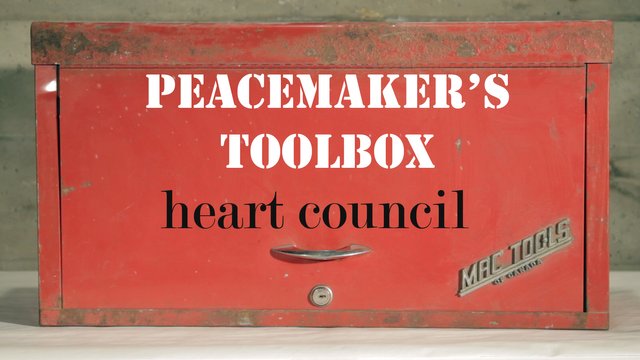
The first Tool in the Peacemakers Toolbox that we're going to work with today is called the Art of Council, but we like to call it Heart Council. We learned this at OUR ecovillage where we met from someone from the Ojai Foundation out of California.
Heart Council is a Peacemaker's Tool because it gives us a framework to communicate with one another in a peaceful way. And, going beyond that, it also helps us get in touch with ourselves, which is the root of peace.
So much of the strife in our world could be lessened if we were taught better ways to express ourselves, listen to others and speak from the heart in nonviolent ways.
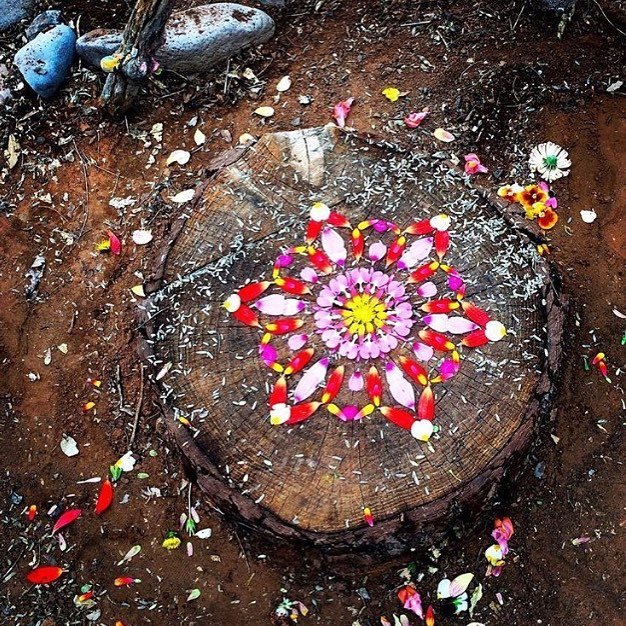
(source)
Heart Council succeeds in this because it is acts as a framework with a few simple guidelines that can really transform the way what we communicate is received- because let's be honest, sometimes it's difficult to state an issue we may have with someone in a way that doesn't trigger them, which leads to us not feeling heard and the issue not being resolved.
So without further ado, I will walk you through the basics of Heart Council.
It is very easy! Each time we do it, we're amazed at why we don't do it more!
Heart council is a healing sacred ritual that can take place between 2-25 people (really as many as you want, but smaller groups are likely more powerful.)
The basic guidelines include
"I" statements, being concise and speaking from the heart,
Speaking one at a time (whoever is holding the talking piece)
Not thinking about what you're going to say while another is talking or before you get the talking piece.
It's that simple!
To begin:
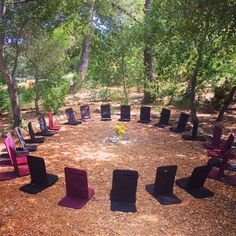
(source)
Sit in a circle and quiet yourself.
We set intentions for the space by lighting a candle and ask that ancestors, light, symbiosis, etc be present during the space (you can invite in whatever healing intentions you have for the council at the beginning. Whatever things you are hoping for, whoever you pray to or who supports you, etc.)
First Round: Check in
In the first round, one person starts with the talking piece (can be whatever you want; a stone, a gem, a memento, feather, etc - you can also have many talking pieces in the center that people can choose from.) They speak from the heart, being concise and honest. A big part of this is not preparing what you're going to say beforehand. Many of us are in the habit of doing this, but a large part about this is seeing what spontaneously arises inside of us. You'll be surprised at the magic that happens in the group if you allow yourself to really open up. Great healing or reconciliation or epiphanies can occur. We always end council feeling lighter than when we began.
After the first person feels finished, they pass the talking piece to the right or left or, if there are only two people, we put it back in the center where the other person can pick it up.
Each person "checks in" with a basic briefing of how they're feeling in this moment, what's "up for them", what might be happening in their lives, etc...
After this, we enter into the rounds.
When Ini and I do it just the two of us, we informally go to Round 2 and usually there are themes that presented themselves in Round 1 that we want to keep understanding. When talking from the heart, it becomes clear what those things are and there's usually a natural flow to this.
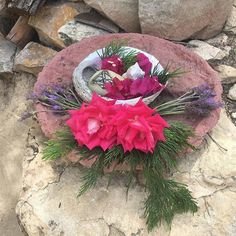
(source)
When in groups...
It can be helpful to keep a focus by picking up on a theme from the check-ins. Perhaps everyone is feeling like they needs more or less of something, that there is an issue in the group that wants to be touched on or there is an idea or vision that wants some space. You can focus on any common theme you want. Again, usually there will be a couple that show up as really being present. Those are the ones to focus on in the next rounds.
Go through 3-4 rounds where everyone gets a chance to speak holding the talking piece.
We find it edifying to say Aho, short for aho mitakuye oyasin in the Lakota tradition meaning All my relations. It's a way to say I have heard you and may what you're saying benefit all of our relations on earth, may they be blessed.
Transformation through Council
This space is always transformative, bringing undercurrents into the light, generating understanding through the magic alchemy of the process. It brings soul light into "ordinary" life with great potency and ease. It's one of the single greatest rituals I know and I'm so thankful to have a partner to cyclically do it with.
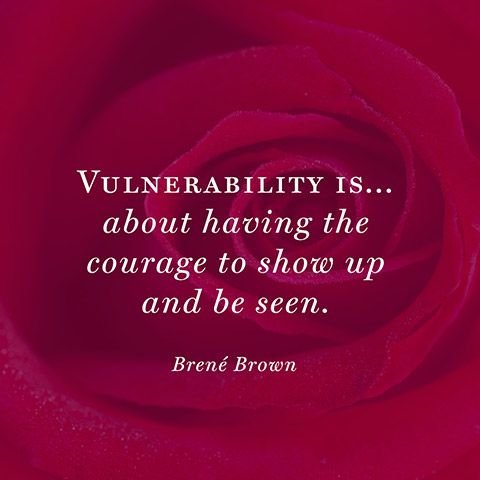
(source)
Council Used as a Peacemaking Tool in Groups
I am going to tell a story now of how I witnessed Council used in a group where a young woman had been molested by a leader in the community. This is why I know this skill is a useful tool in Peacemaking- because I've witnessed it and felt the power.
The young woman was molested by an older man who held considerable social, monetary and decision making power within an organization. He was married and he and this young woman were spending considerable time together working on a project together.
He made an advance at her, she froze and he continued. She was incredible shaken by this event, didn't know how to respond as it completely caught her off guard and she felt taken advantage of and violated.
Usually in situations like this that happen often in organizations, we don't know how to handle them. This is where the Art of Council done with meaning, intention and with people who are willing to "go there" can be of enormous benefit. Oftentimes events like this are swept under the rug, ignored, one person is fired, etc. Usually the woman has to suffer in silence and even keep working in those conditions.
This was a very special circumstance because both the woman and the man felt OK with taking part in the council. Many of the members wanted the man expelled from the community. They wanted ostracism. I personally was very impressed he had the guts to show up as many of the male members were feeling violent (not acting violent) toward him and many people had a lot of hatred come up toward him.
We sat in the circle and, after someone had given a briefing for the intention of the Council and set the intention, we each checked in with how we were feeling.
Most people were very, very angry at the man. It brought up incredible emotions for some. Some people had been raped in the past or had young daughters or cousins who they imagined in the situation of the young girl. This brought up strong emotions and people cried, yelled and expressed strong emotions.
This is where the rules of Council come into play.
- Make "I" statements.
In order for the person to not feel accused, which is so easy to do in situations like this, we speak using "I" statements:
"I" feel _____ when....
This keeps the statement focused on the feelings of the individual expressing and not an attack statement.
"You... _____ ....
These statements immediately make the other person clam up and shut down.
We went around the circle making these "I" statements and it was very powerful to witness every person's emotions and process while they held the talking piece. It's very important not to interrupt one another. It gives people a feeling of freedom and safety while they're talking.
After round 1, the people who were directly involved had a chance to speak from the heart.
The girl was obviously distraught and crying. She knew she had the support of the community though as she shared her experience and emotions. It was healing for her to be witnessed and a powerful way too for the man who had molested her to witness all of the pain his actions had brought up. It was actually very healing and amazing for all of us who were there as we could witness a different way to go about dealing with a situation like this. Many times our only options are to call the police and ostracize, which only isolates the offender and no healing can take place.
This allows a space of healing to be created.
From the Council, the organization felt much clearer about what it could do.
The man wasn't ostracized, but there were strict limits set on the involvement in the community. Many members stated they didn't want their children around him any longer unsupervised and many of the men especially stated that they would be "watching him". Now he knew he was not alone and had repurcussions for his actions. A lot better than being sent off into isolation to likely perpetrate again!
It's important to note that this was an organization who regularly practiced Council, so this wasn't new to everybody and they were committed to doing it often (once a week) together. This is where Council can really transform groups of people or even families. It helps get our true feelings out there in a safe way and the guidelines allow different forms of communication to take place. Ini and I personally try to do it on every New Moon and Full Moon. We find it's amazing for our relationship and ourselves personally. Insights usually occur and we feel a sense of fresh peace and vigor after finishing.
If you'd like a more indepth look at this Tool, I suggest getting The Way of Council by Zach Zimmerman & Virginia Coyle.
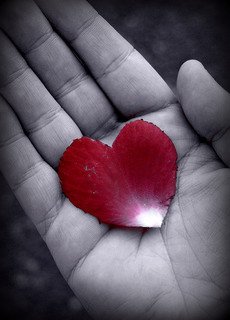
(source)
I remember on one of my management courses doing the art of the circle exercises and covering a little of what you mention here it was a truly interesting session
Downvoting a post can decrease pending rewards and make it less visible. Common reasons:
Submit
cool! yeah, it can be super powerful for groups. thanks for stopping by!
Downvoting a post can decrease pending rewards and make it less visible. Common reasons:
Submit
This is definitely something one can benefit from. I also feel the need to, in a sense, formalise or ritualise our practice of communication with the intentions of listening to opening hearts. Too often we are focused on only our own emotions and logic and completely miss the point of what the other may be attempting to express. I want to try to implement something similar here. Thanks for expressing.
Downvoting a post can decrease pending rewards and make it less visible. Common reasons:
Submit
Yeah exactly! I feel what you said is a big part of it. When we formalize or ritualize it it does give us a chance to make space for ourselves to actually hear other people. That is a huge part of it! Thanks for sharing!
Downvoting a post can decrease pending rewards and make it less visible. Common reasons:
Submit
Ok right Can all the solutions be solved by contacting?
Downvoting a post can decrease pending rewards and make it less visible. Common reasons:
Submit
I really love this. Especially the story you told of the practice in action. That is so incredibly powerful. I am blown open.
Downvoting a post can decrease pending rewards and make it less visible. Common reasons:
Submit